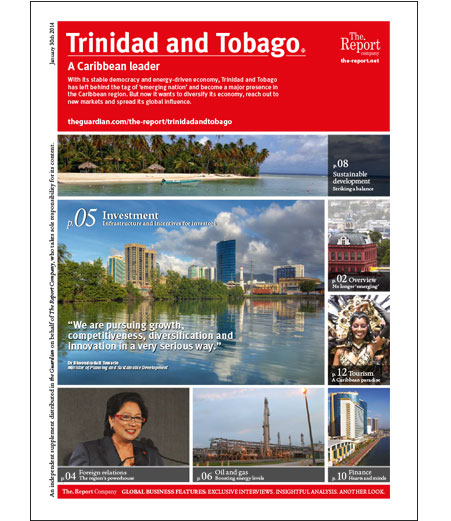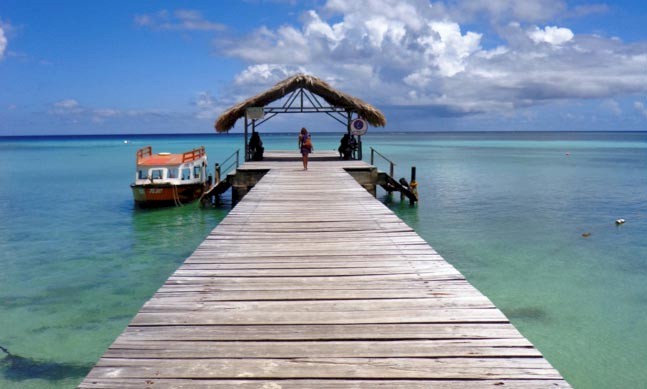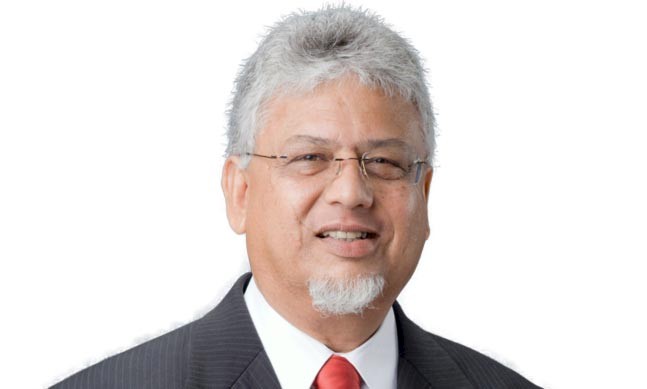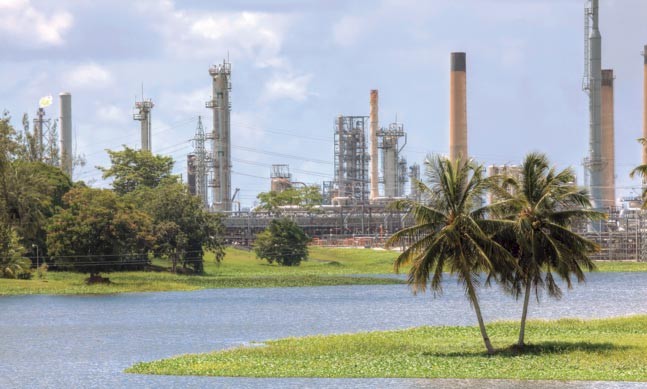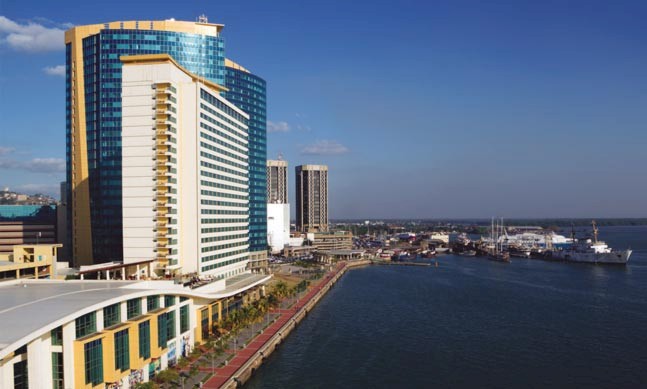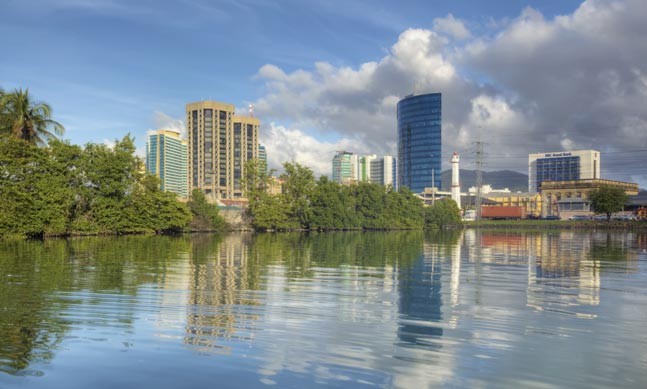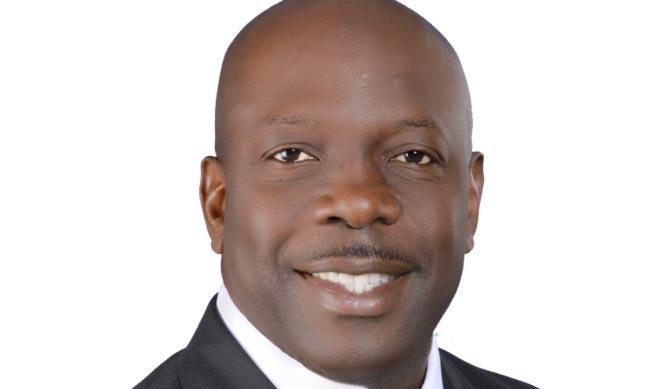Chandresh Sharma served as minister of transport from June 2012 to September 2013, and now holds the portfolio of minister of tourism. Whilst still in his former role, he spoke to The Report Company about his view of how the ministry can best serve the people of Trinidad and Tobago, and outlined his initiatives and strategies.
The Report Company: What is your assessment of the current status of the transport sector in Trinidad and Tobago?
Chandresh Sharma: Perhaps we can start with the global picture in transportation. Transportation is no longer just about moving goods and services; it is about moving minds. Transport means that best practices can be shared and it means people and their ideas to reach out to any country in the world.
In the ministry, transportation is not only seen in the physical sense of air, land and sea. We are generating ideas and that must be encouraged as much as possible. We start by looking at the transportation of human cargo in the first instance and then we take the intellect of that human cargo. We want that worker to be happy; we want the traffic to be minimal, and we want communication and conversations to take place so the government looks at that in a holistic way.
TRC: How would you describe your way of working?
CS: Communication is key. People can communicate with me, but they must also see a willingness to listen and to act. When people start to see that the government is listening, they start to become more involved and when people get more involved it has the benefit of reducing crime.
TRC: How do you prioritise economic development while ensuring environmental protection and preservation?
CS: Environmental protection is a must, especially for a small country. We are encouraging it and we are developing it. We’re not just paying lip service to it. There is a challenge all over the world where public transport is becoming more expensive. We want to make sure that where we can go green, we go green. But it’s a costly thing and if going green costs you $10 per passenger, you can’t impose that on the passenger; you have to absorb it.
“We can really and truly be one of the top destinations in the Caribbean and the goal is not necessarily to have the highest arrival figures, but to have the most profitable arrival figures.”Post This
TRC: How would you assess relations with the rest of the CARICOM region?
CS: This country is an industrial country and it’s not just the oil fields, we are manufacturers as well; we manufacture a lot of things here and provide services for the rest of the Caribbean.
We need to work as a team. We have close links with the other ministers across the entire Caribbean and we share ideas. That leads to the global best practices, which is important. For example, there’s a UN campaign on reducing road accidents and we have been able to go on a global campaign joining the global players. At the ministry of transport, those are the things we are looking at, not just the taking of goods from point A to point B. We are taking a more holistic approach. We want people to be happy.
TRC: What can be done to increase interconnectivity in the Caribbean?
CS: At the CARICOM level there have been discussions relating to air and sea transport. There was a discussion about having inter-island ferries, but those are rather expensive and funding is always a challenge for CARICOM countries. The ideal situation would be to get ferries that are able to move through the islands to transport goods and services. There’s a strong desire for that and I’m sure with the coming of the prime minister’s chairpersonship of CARICOM there will again be discussions.
TRC: Which would be the main projects the ministry is working on and what opportunities are there in terms of public private partnerships?
CS: There is this trend now to use the PPP model, which has proven to be quite effective. Governments the world over have always had problems such as cost and time overruns on projects and they keep looking to see how we can better deliver. There are companies that are specialised in finance or in project management or in a particular area such as hospitals, so you try to engage them and the way to engage them is through the public private partnership model. We have one project, similar to in the United States or England, where when a police officer stops a driver he can take the driver’s license and get a host of information that may be useful to him in the execution of his duty. We entered into a contract with the government of Nova Scotia to computerise that. It’s basically the computerisation of data. We are the only country in the Caribbean that is heading in that direction, but we are making our knowledge available to the other islands as well. While contracts will be executed here, there will be some learning taking place in the rest of the Caribbean.
In terms of the other projects we have here, the ports are always in demand. We’re planning the expansion of the existing ports as well as the construction of a whole new port to cope with the new, bigger ships. We expect an upturn in the cruise-liner business and because we are a manufacturing country where people are increasingly coming to set up their plants, the goods must come to the port, get to the factory and then get the finished product back onto the port. We are exploring PPP models to find out the best practices, as well as entering government-to-government discussions.
“What we’re doing is drilling right down into exactly what Trinidad is and exactly what Tobago is and building on that. We are a very unique island nation. The people of this country really and truly make the destination, because the people bring their festivals, their religions, their food and all their culture and it makes for a very different Caribbean experience.”Post This
TRC: How can Trinidad and Tobago capitalise on its geographical location?
CS: Trinidad and Tobago has a very good physical location but that’s not enough. Can we feed what is required in terms of the technology? The short answer is yes. Can we provide the workforce? The short answer is yes. Can we provide the air transport that is required? The vice president of the United States and the Chinese president, when they came to Trinidad and Tobago, were very impressed because they saw that this is a country that is moving ahead. And more than moving ahead, this is also a country that can teach others something
TRC: What is your outlook for the future of the transportation sector and for the ministry? What are your plans?
CS: All ministers are required to execute government policy. The policy directions are to keep the best global practices. While a minister may have very good visions of what needs to be done he must make sure that he sticks to the best advice. I can’t just execute what I think is best but rather what is actually best. We are spenders of taxpayers’ money. The vision is always in keeping with what the requirements are. We need more space at the port, for example, so we look at what space is needed and how we’re going to spend that money intelligently. We spend government money doing the right thing.


